It’s always important to test the capabilities of your computer and compare your hardware, which is possible with the help of PC benchmark software.
You may want to use it for various reasons, for example, when you have assembled your own PC or when you’re planning to upgrade your existing one. It’s essential to draw comparisons between different processors and other elements when you’re looking for an upgrade, so in that regard, benchmark software is very handy.
Top Benchmarking Tools For Your PC in 2024
Many tools help you test the efficiency of your computer, but you only want to choose from the best, which is why this list exists.
You’ll discover only the best PC benchmark software here. But, if you’re a beginner who doesn’t have much of an idea about benchmarking, I’ve covered the basics of PC benchmarking at the end of the list. So, you can scroll down to get an idea and then come back to this list.
With that being said, let’s look at the benchmarking software you can use to carry out the tests on your PC.
PCMark 10
PCMark 10 is one of the best benchmarking software available for Windows computers as it mainly focuses on real-world scenarios such as web browsing, video conferencing, photo editing, and document processing to provide a close-to-real-life overview of your computer.
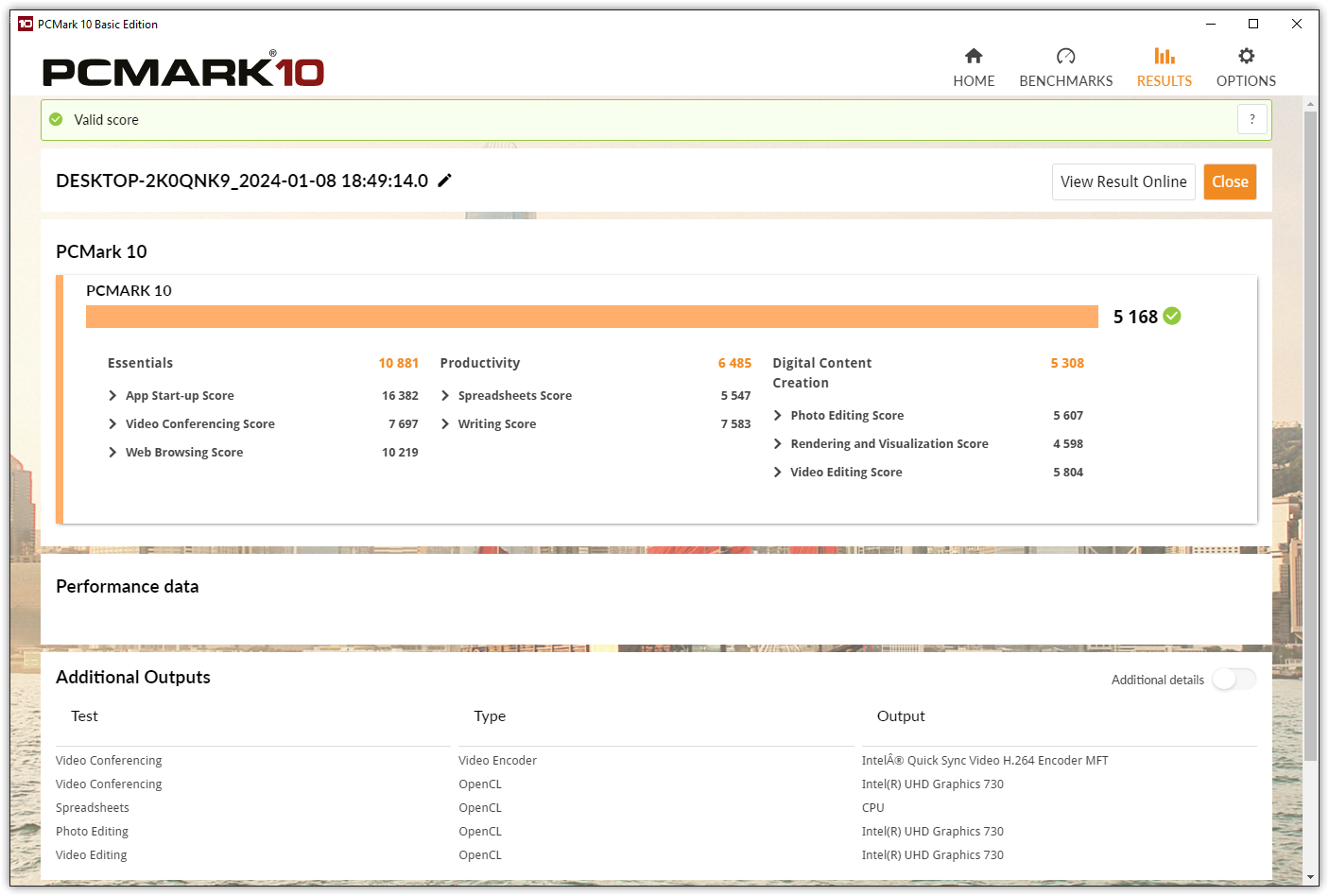
But what I loved about PCMark 10 is its simplicity. Even if you are about to use the benchmarking software for the first time, it will hold your hands and get things done in the easiest manner possible.
Key Features:
- Real-world workloads
- Multiple benchmark options, including battery life test
- Cross-comparison through an online database
- Detailed results for deeper analysis
After using PCMark, I felt is if you are a normal user whose workload revolves around basic tasks like web browsing, working with documents, office tasks, and coding, PCMark 10 may be the best choice for you unless you want to perform GPU-intensive tasks.
Yes, PCMark 10 is mainly focused on CPU and RAM testing with less emphasis on GPU. Sure, you can still test your GPU, but if that’s your key priority, there are other better options.
Geekbench
Geekbench is a well-known name for benchmarking, and there are reasons for it. You get one-click tests for your CPU and GPU to simulate real-world scenarios to get the most practical benchmarking possible.

Another good thing about Geekbench is being a cross-platform utility, especially for me, as I’m an open-source freak, and I enjoy having support for Linux.
Apart from Linux, you get support for Android, iOS, and macOS, so you can compare them side-by-side.
Key Features:
- Lightweight
- Geekbench Browser to share and compare results
- Precise CPU and RAM benchmarks (ideal for RAW benchmarking)
- The industry standard for Android benchmarking
While testing, I felt Geekbench is one of the best PC benchmarking utilities when you want to know the raw power. It is built for practicality by giving you only tests that matter to make testing fast-forward and practical.
Cinebench
If your workflow revolves around graphics-intensive tasks such as video rendering and photo editing, or you want to find out single-core and multi-core performance in a precise manner, then Cinebench can be a good choice.
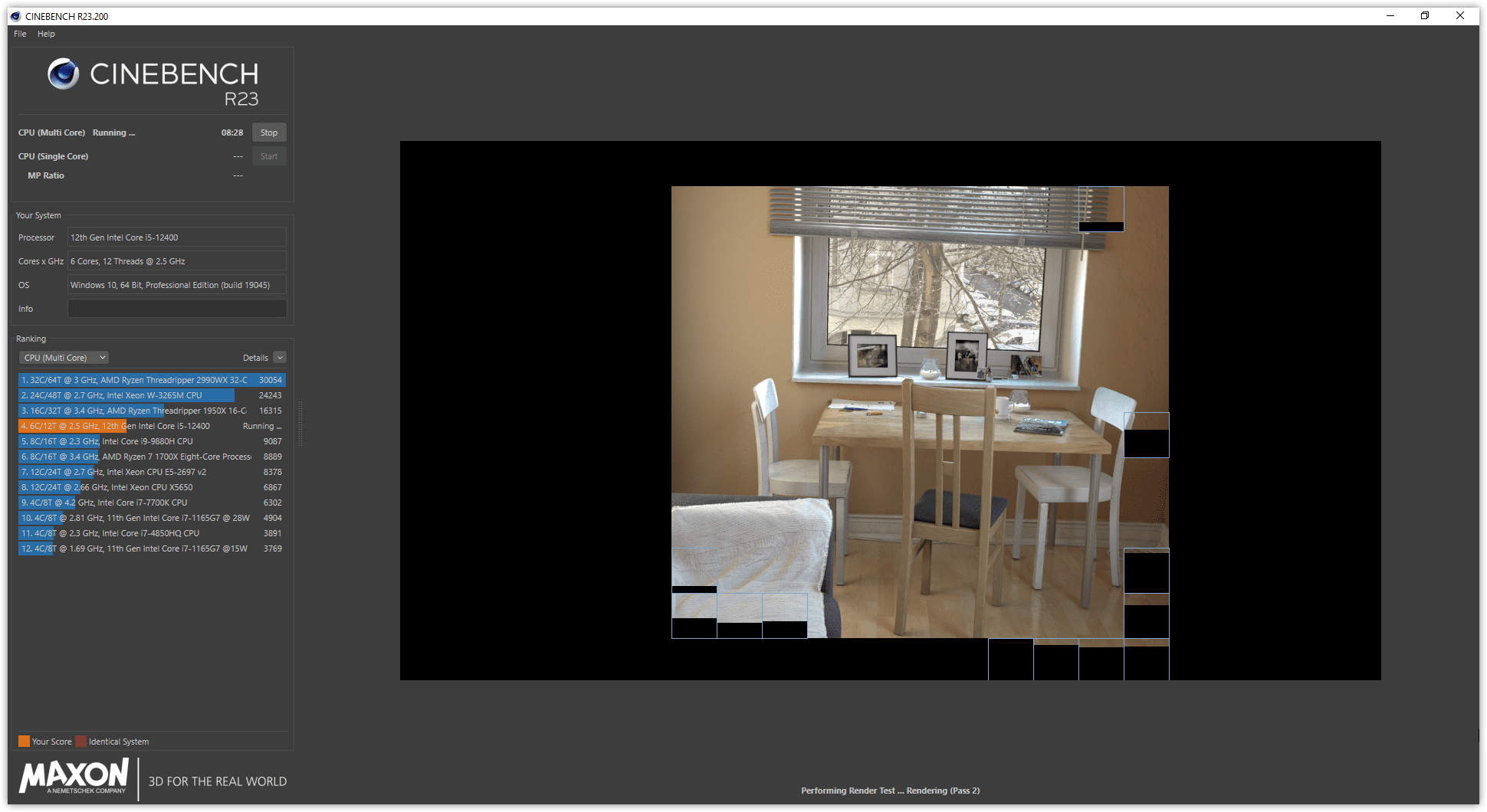
Cinnebench has a niche audience as it will put your hardware to limits for a longer duration to know its limits, which may not be a regular user may not find relevant.
But if you want to know the rendering capabilities or the capability of the CPU and GPU alone, then Cinebench is perfect for you.
Key Features:
- Free and simple to use
- Ability to stress test for longer durations
- Cross-platform
In my opinion, if your main priority is to know the raw performance of your system, then Cinebench is a perfect choice. Still, if you are a normal user, then the Cinebench score may not give you real-life data as it mainly focuses on numbers and rendering.
PassMark PerformanceTest
Right after installation, I was amazed by how well-organized the user interface was. Unlike other test software, PerformnceTest has various testing options while being organized at the same time.
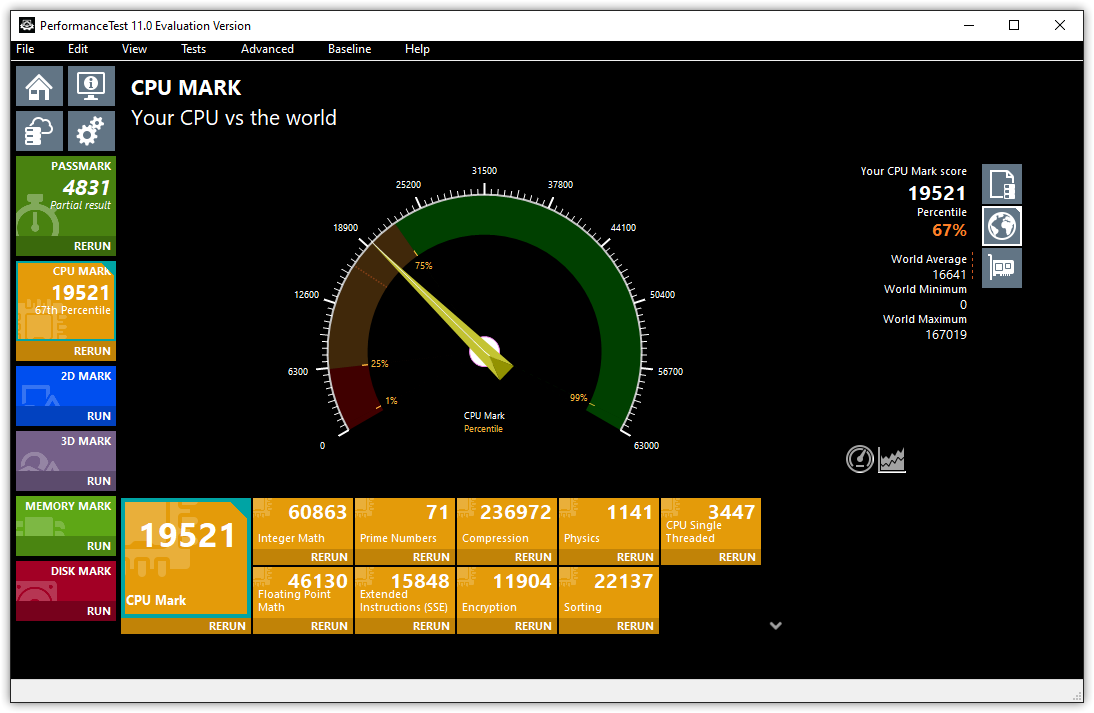
But that was not enough. The most amazing feature of PerformaceTest is you can run the PerformanceTest directly from a USB drive, which will be great for the system admins and advanced users.
But there’s even more to it.
Key Features:
- Uses the PassMark Rating, a single score to encompass overall system performance
- Offers testing options for every possible part of your system
- Cross-platform
- Ability to create customized tests to suit your needs
While using PassMarks’s PerformaceTest, it was clear that it is built to cater needs of almost every user. From basic tests to advanced tests, you get all.
The ability to create custom tests for advanced testing was a major plus for me and how it can be used directly from USB was simply a clear move. Sure, if you are coming from something simple, you may find these options overwhelming, but give it time, and you’ll love it.
UserBenchmark
UserBenchmark utility is famous for comparing computer hardware over the internet, which is a good thing, especially if you are about to build your custom PC or purchase a new computer.

But what grabbed my attention was how easily they let you benchmark your system. With the free version, if the server is full, you can play a game while you get your chance to benchmark.
Key Features:
- Ease of use
- Compare your data with the world
- Data to reference your purchase
The one thing to note here is reviews of UserBenchmark are mixed. Some users feel the utility is biased toward Intel users, and some have also raised questions about the authenticity of the results.
3DMark
The 3DMark software is specifically designed to find how the computer is dealing with 3D graphic rendering and how the CPU is working under heavy loads.
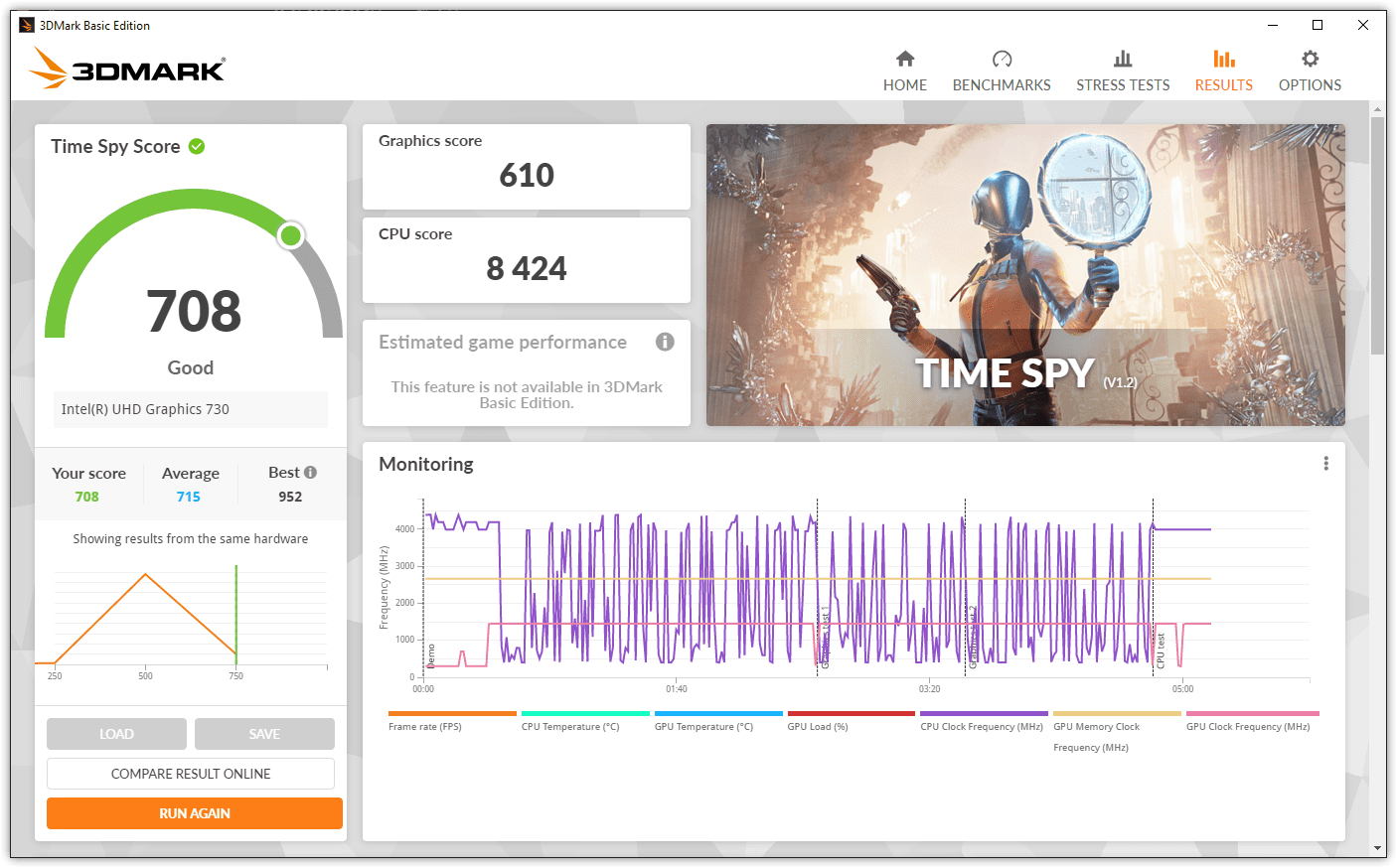
The thing here to note is this software is specifically designed for gamers, so the normal user may not find this useful, but it is among the best suits for gaming benchmarks, so if you are a true gamer, then you already know about this software.
Key Features:
- VR Preview benchmark
- Industry-standard in the game benchmarking
- Multiple tests for specific gaming needs
The thing to note is if you are a non-gamer, you may not find 3DMark as useful as the other benchmarking tools on the list, but if you are someone who prioritizes graphics performance, then 3DMark will get the job done.
Superposition Benchmark
The Superposition benchmark utility is designed to stress-test your PC’s graphics card (GPU) and CPU under demanding visual scenarios.
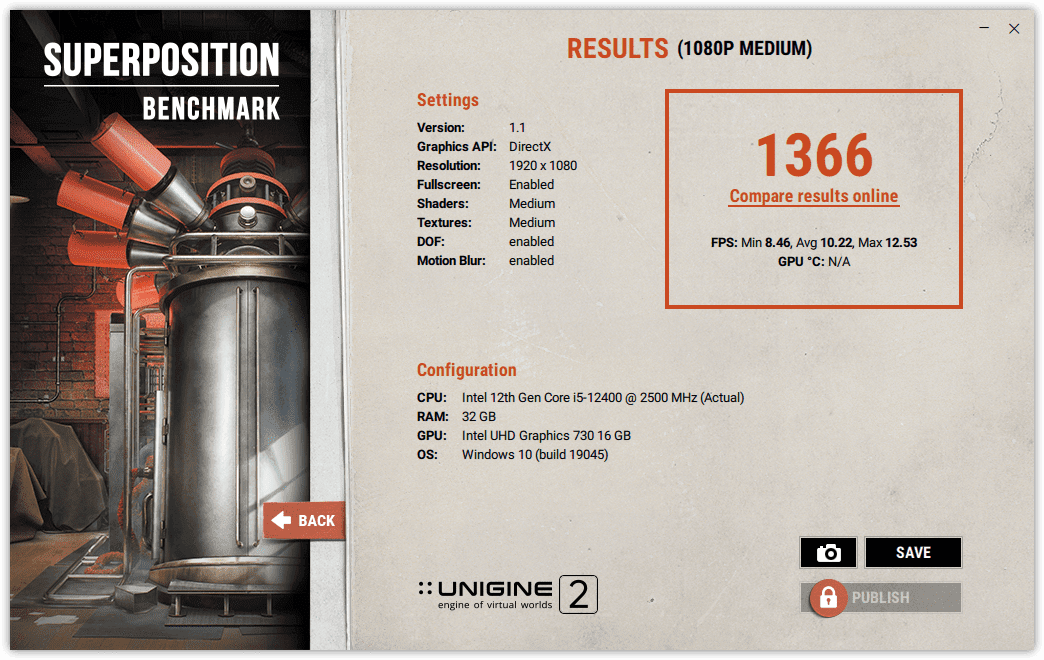
But the best part here is it simulates a futuristic game environment with complex lighting pushing CPU and GPU to its limits to know how your hardware will perform when thrown at high-end gaming and demanding rendering tasks.
Key Features:
- Extreme tests to push CPU and GPU to its limits
- Uses SSRTGI (Screen-Space Ray-Traced Global Illumination) dynamic lighting technology
- Support for VR
- GPU temperature and clock monitoring
The only thing that I didn’t like about this software is that most of the features are locked behind a paywall, and it is built for gamers and users with intense GPU workloads.
SiSoftware Sandra
SiSoftware Sandra is the most advanced benchmarking software, and trust me, when I say advanced, I mean it.
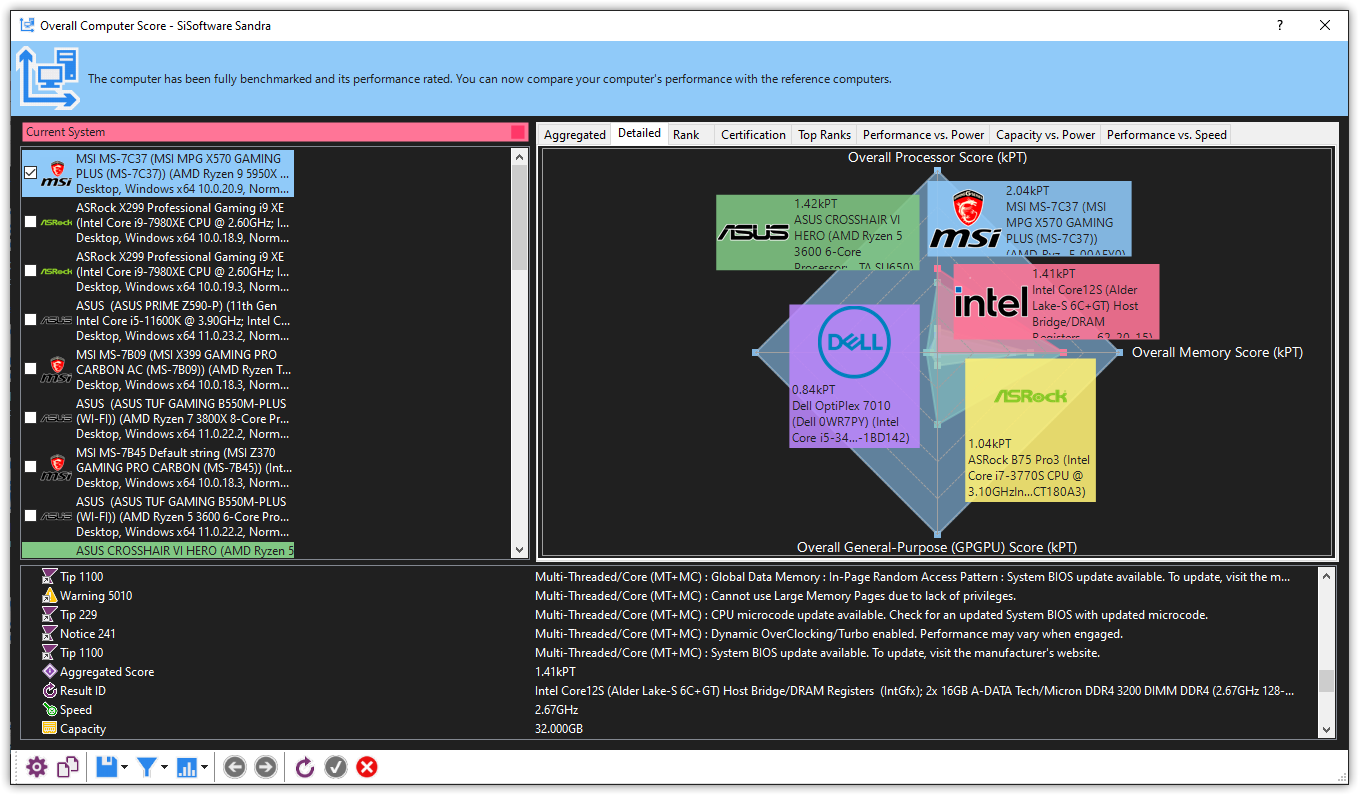
SiSoftware Sandra had the most number of tests and options. The UI is not the most user-friendly, which simply means it is meant to get the job done with the maximum data and options possible.
In my opinion, SiSoftware Sandra has the best benchmarking option labeled as “Overall Computer Score,” which took a lot of time, but the given data was impressive.
Key Features:
- Reports on virtually every aspect of your hardware and software, including CPU, RAM, motherboard, storage, network, and more.
- Advanced diagnostic tools.
- Customization of tests and reports.
- Cross-platform testing.
- Ability to compare the data with other hardware inside the application.
So, if you are an advanced user who seeks a deep understanding of their PC’s inner workings, then look no further and use the SiSoftware Sandra benchmarking utility.
The only thing that I didn’t like about this utility is the user interface is not the easiest to navigate and not the prettiest to look at. It just gets the job done.
Now that you’ve seen the list of PC benchmarking software, you’d also do well to understand how benchmarking works, especially if this is your first time.
What Does Benchmarking Mean?
To put it in the simplest words possible, benchmarking is basically the process of putting your computer’s performance to the test in order to find out the maximum capability of the system or get a clear idea of how it’s performing.

It’s a useful way of comparing different systems and coming to a conclusive decision regarding your purpose for running the tests.
You’ll notice that most modern PCs and games often provide consumers with benchmarks for various applications and games. Even casual gamers check their PC’s benchmarks to understand where their hardware stands in terms of performance. Let’s find out why that is.
Why Is Benchmarking Important and Popular in Terms of PCs? 🖥️
Benchmarking has been an integral part of any PC’s performance because it gives a clear picture of the system’s capabilities. Whether you want to read reviews about the performance results of a new PC or you want to carry out a test on your own device, benchmarking plays a huge role in that.
It has a whole lot of benefits, such as:
- Stress-test the CPU of a newly-assembled PC
- Pinpoint sudden performance issues
- Check if your tweaks are improving your computer’s performance or not
Also Read: Best CPU Stress Test Software for Robust Performance
If you’re someone who closely monitors the performance of your PC, then the process of benchmarking would be very important to you because you’d know if your system’s current drives are slower compared to the new models.
Benchmarking software often provides an aggregated score after checking multiple aspects of your PC’s hardware. So, what exactly do they check?
What Aspects of a PC Are Tested in Benchmarking? ⚙️
Benchmarking is supposed to be an in-depth overview of your PC’s internal mechanism, so the main things that are tested are CPU, GPU, SSD, thermal throttling, temperature, and even the overall stability of your computer.
Wrapping Up
Utilizing the above PC benchmark software will help you eliminate the guesswork and dive straight into the crux of things.
All of them do a great job of testing your PC, and fortunately, they’re either completely free of cost or they at least have a free starting plan to make sure you can decide without feeling the heat of the price tag.
Most importantly, they’re all fairly lightweight, so they won’t be a burden on your computer.
More For Your PC
You can trust Geekflare
At Geekflare, trust and transparency are paramount. Our team of experts, with over 185 years of combined experience in business and technology, tests and reviews software, ensuring our ratings and awards are unbiased and reliable. Learn how we test.

